Giúp mình bài này với được không ạ😓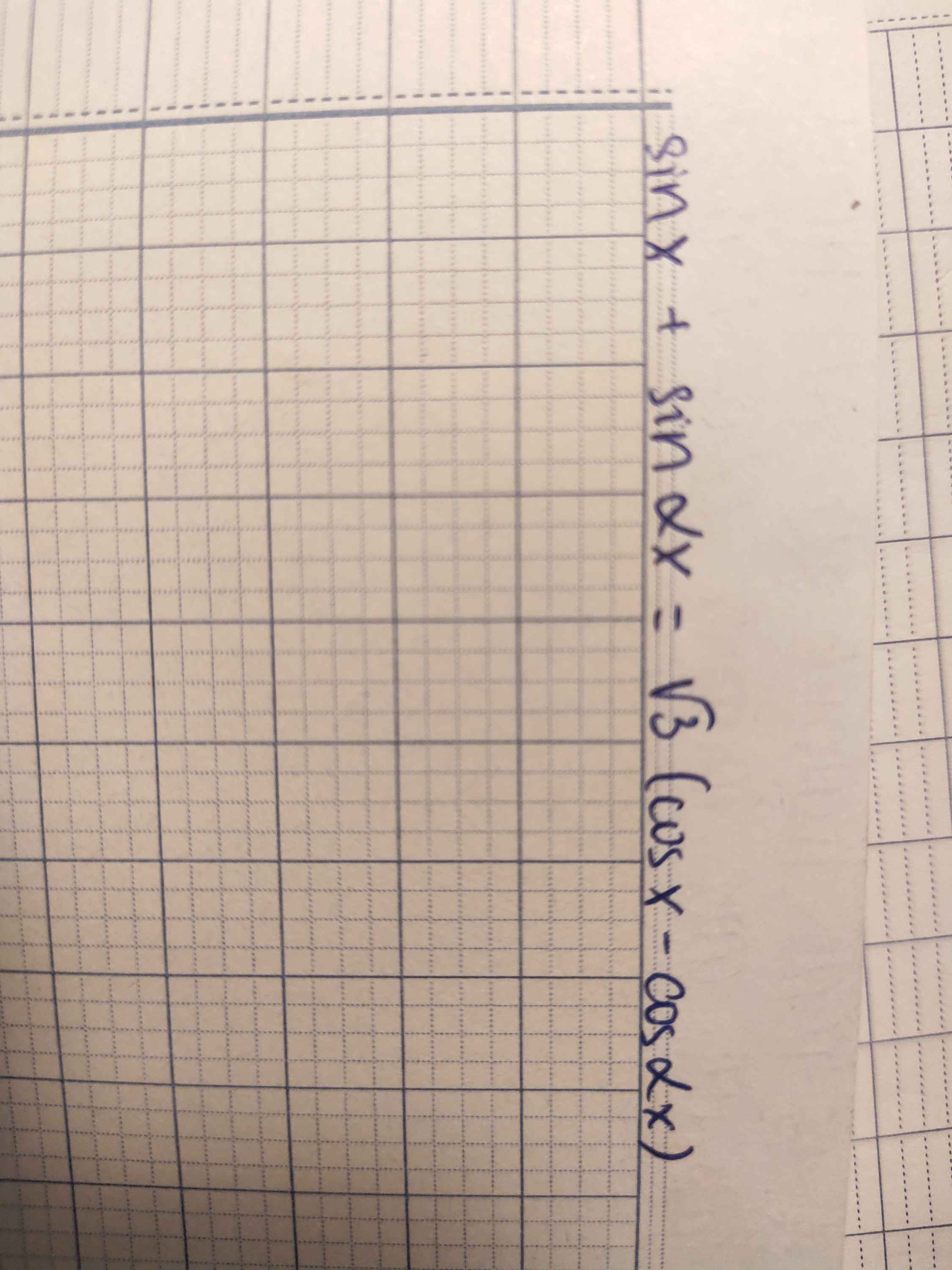
Hãy nhập câu hỏi của bạn vào đây, nếu là tài khoản VIP, bạn sẽ được ưu tiên trả lời.




Phương trình hoành độ giao điểm (d) và (P):
\(x^2-2x-3=ax-a-3\)
\(\Leftrightarrow x^2-\left(a+2\right)x+a=0\)
\(\Delta=\left(a+2\right)^2-4a=a^2+4>0;\forall a\Rightarrow\) (d) luôn cắt (P) tại 2 điểm pb
Theo hệ thức Viet: \(\left\{{}\begin{matrix}x_A+x_B=a+2\\x_Ax_B=a\end{matrix}\right.\)
Mặt khác do A, B thuộc (d) nên: \(\left\{{}\begin{matrix}y_A=ax_A-a-3\\y_B=ax_B-a-3\end{matrix}\right.\)
\(y_A+y_B=0\)
\(\Leftrightarrow a\left(x_A+x_B\right)-2a-6=0\)
\(\Leftrightarrow a\left(a+2\right)-2a-6=0\)
\(\Leftrightarrow a^2-6=0\)
\(\Leftrightarrow a=\pm\sqrt{6}\)

27.
Bán kính mặt cầu ngoại tiếp tứ diện vuông được tính bằng:
\(R=\sqrt{\dfrac{OA^2+OB^2+OC^2}{4}}=\sqrt{\dfrac{1^2+2^2+3^2}{4}}=\dfrac{\sqrt{14}}{2}\)
28.
Từ giả thiết suy ra \(A\left(2;2;2\right)\)
Gọi điểm thuộc mặt Oxz có tọa độ dạng \(D\left(x;0;z\right)\)
\(\Rightarrow\overrightarrow{AD}=\left(x-2;-2;z-2\right)\)
\(\overrightarrow{BD}=\left(x+2;-2;z\right)\) ; \(\overrightarrow{CD}=\left(x-4;-1;z+1\right)\)
D cách đều A, B, C \(\Rightarrow\left\{{}\begin{matrix}AD=BD\\AD=CD\end{matrix}\right.\)
\(\Rightarrow\left\{{}\begin{matrix}\left(x-2\right)^2+4+\left(z-2\right)^2=\left(x+2\right)^2+4+z^2\\\left(x-2\right)^2+4+\left(z-2\right)^2=\left(x-4\right)^2+1+\left(z+1\right)^2\end{matrix}\right.\)
\(\Leftrightarrow\left\{{}\begin{matrix}2x+z=1\\2x-3z=3\end{matrix}\right.\) \(\Rightarrow\left\{{}\begin{matrix}z=-\dfrac{1}{2}\\x=\dfrac{3}{4}\end{matrix}\right.\)
\(\Rightarrow P\left(\dfrac{3}{4};0;-\dfrac{1}{2}\right)\)
29.
Do tâm I mặt cầu thuộc Oz nên tọa độ có dạng: \(I\left(0;0;z\right)\)
\(\Rightarrow\left\{{}\begin{matrix}\overrightarrow{AI}=\left(-3;1;z-2\right)\\\overrightarrow{BI}=\left(-1;-1;z+2\right)\end{matrix}\right.\)
Mặt cầu qua A, B nên \(AI=BI\)
\(\Leftrightarrow3^2+1^2+\left(z-2\right)^2=1^2+1^2+\left(z+2\right)^2\)
\(\Leftrightarrow8z=8\Rightarrow z=1\)
\(\Rightarrow I\left(0;0;1\right)\Rightarrow R=IB=\sqrt{1^2+1^1+3^2}=\sqrt{11}\)
Phương trình mặt cầu:
\(x^2+y^2+\left(z-1\right)^2=11\)

42.
ĐKXĐ: \(x>0\)
\(log_3^2x-5log_3x+6\le0\)
\(\Leftrightarrow\left(log_3x-2\right)\left(log_3x-3\right)\le0\)
\(\Rightarrow2\le log_3x\le3\)
\(\Rightarrow9\le x\le27\)
\(\Rightarrow2a-b=9.2-27=\)
43.
\(r=\dfrac{1}{2};h=1\)
\(\Rightarrow V=\pi r^2h=\dfrac{\pi}{4}\)
44.
ĐKXĐ: \(a>0\)
\(log_2a+log_23=log_2\left(2a+2\right)\)
\(\Leftrightarrow log_2\left(3a\right)=log_2\left(2a+2\right)\)
\(\Rightarrow3a=2a+2\)
\(\Rightarrow a=2\)
45.
\(V=\dfrac{1}{3}.6a.20a^2=40a^3\)
46.
Pt hoành độ giao điểm:
\(-x^2+2=x^3+2\Leftrightarrow x^3+x^2=0\)
\(\Leftrightarrow x^2\left(x+1\right)=0\Rightarrow\left[{}\begin{matrix}x=0\\x=-1\end{matrix}\right.\)
\(\Rightarrow\) Hai đồ thị có 2 giao điểm
47.
\(y'=x^2-5x+6=0\Rightarrow\left[{}\begin{matrix}x=2\\x=3\end{matrix}\right.\)
\(f\left(1\right)=\dfrac{29}{6}\) ; \(f\left(2\right)=\dfrac{17}{3}\) ; \(f\left(3\right)=\dfrac{11}{2}\)
\(\Rightarrow\) Hàm đạt min tại \(x=1\) và đạt max tại \(x=2\)
\(\Rightarrow x_1+x_2=3\)
48.
\(y'=-4x^3=0\Rightarrow x=0\)
Do \(a=-1< 0\Rightarrow\)hàm đồng biến trên \(\left(-\infty;0\right)\)
49.
\(y'=3ax^2+2bx+c\Rightarrow\left\{{}\begin{matrix}c=0\\12a+4b+c=0\end{matrix}\right.\)
\(x=0;y=d\Rightarrow d=2\)
\(x=2;y=-2\Rightarrow8a+4b+2c+d=-2\)
\(\Rightarrow8a+4b+2=-2\Rightarrow\left\{{}\begin{matrix}12a+4b=0\\8a+4b=-4\end{matrix}\right.\) \(\Rightarrow\left\{{}\begin{matrix}a=1\\b=-3\end{matrix}\right.\)
\(\Rightarrow y=x^3-3x^2+2\)
\(\Rightarrow y\left(-2\right)=-18\)


Câu 3:
Phương trình hoành độ giao điểm: \(-x=x^3\Leftrightarrow x^3+x=0\Leftrightarrow x\left(x^2+1\right)=0\Leftrightarrow x=0\).
Phương trình có \(1\) nghiệm do đó chọn C.
Câu 4:
\(2^{2x^2-7x+5}=32\)
\(\Leftrightarrow2^{2x^2-7x+5}=2^5\)
\(\Leftrightarrow2x^2-7x+5=5\)
\(\Leftrightarrow2x^2-7x=0\)
\(\Leftrightarrow\left[{}\begin{matrix}x=0\\x=\dfrac{7}{2}\end{matrix}\right.\)
Suy ra \(x_1=0,x_2=\dfrac{7}{2}\).
\(x_1+4x_2=14\).
Chọn A.

24.
\(log\left(a^3b^2\right)=loga^3+logb^2=3loga+2logb=3x+2y\)
25.
\(f'\left(x\right)=0\) có 2 nghiệm bội lẻ \(x=\left\{-\dfrac{3}{2};1\right\}\) nên hàm có 2 cực trị
26.
\(\lim\limits_{x\rightarrow\infty}\dfrac{x^2+3x-4}{x^2-16}=\lim\limits_{x\rightarrow\pm\infty}\dfrac{1+\dfrac{3}{x}-\dfrac{4}{x^2}}{1-\dfrac{16}{x^2}}=1\)
\(\Rightarrow y=1\) là TCN của đồ thị hàm số
\(\lim\limits_{x\rightarrow-4}\dfrac{x^2+3x-4}{x^2-16}=\lim\limits_{x\rightarrow-4}\dfrac{\left(x-1\right)\left(x+4\right)}{\left(x-4\right)\left(x+4\right)}=\lim\limits_{x\rightarrow-4}\dfrac{x-1}{x-4}=\dfrac{5}{8}\) hữu hạn
\(\Rightarrow x=-4\) không phải tiệm cận đứng
\(\lim\limits_{x\rightarrow4^+}\dfrac{x^2+3x-4}{x^2-16}=+\infty\Rightarrow x=4\) là 1 TCĐ
Vậy đồ thị hàm số có 2 tiệm cận
27.
\(y'=x^2-2x+2\)
\(y'\left(1\right)=1\)
\(y\left(1\right)=\dfrac{7}{3}\)
Phương trình tiếp tuyến có dạng:
\(y=1\left(x-1\right)+\dfrac{7}{3}\Leftrightarrow y=x+\dfrac{4}{3}\)
28.
ĐKXĐ: \(x>0\)
\(\log x\le1\)
\(\Rightarrow x\le10\)
Kết hợp ĐKXĐ ta được \(x\in(0;10]\)
29.
Gọi H là trung điểm AB \(\Rightarrow SH\perp\left(ABCD\right)\)
Do SAB vuông cân tại S \(\Rightarrow SH=\dfrac{1}{2}AB=\dfrac{a}{2}\)
\(\Rightarrow V=\dfrac{1}{3}SH.a^2=\dfrac{a^3}{6}\)

C3: Hệ bpt trở thành: \(\left\{{}\begin{matrix}x\ge1-m\\mx\ge2-m\end{matrix}\right.\)
a, Để hệ phương trình vô nghiệm thì \(m=0\)
b, Để hệ có nghiệm duy nhất thì \(\left\{{}\begin{matrix}m\ne0\\\dfrac{m-2}{m}=1-m\end{matrix}\right.\)
\(\Leftrightarrow\) \(\left\{{}\begin{matrix}m\ne0\\m=\pm\sqrt{2}\end{matrix}\right.\) \(\Leftrightarrow\) \(m=\pm\sqrt{2}\)
c, \(x\in\left[-1;2\right]\) \(\Leftrightarrow\) \(-1\le x\le2\)
Để mọi \(x\in\left[-1;2\right]\) là nghiệm của hệ bpt trên thì
\(\left\{{}\begin{matrix}-1\le1-m\le2\\-1\le\dfrac{2-m}{m}\le2\end{matrix}\right.\) với \(m\ne0\)
\(\Leftrightarrow\) \(\left\{{}\begin{matrix}2\ge m\ge-1\\m\ge\dfrac{2}{3}\end{matrix}\right.\) \(\left(m\ne0\right)\)
\(\Leftrightarrow\) \(2\ge m\ge\dfrac{2}{3}\)
Vậy \(m\in\left[\dfrac{2}{3};2\right]\) thì mọi \(x\in\left[-1;2\right]\) là nghiệm của hệ bpt
Chúc bn học tốt!


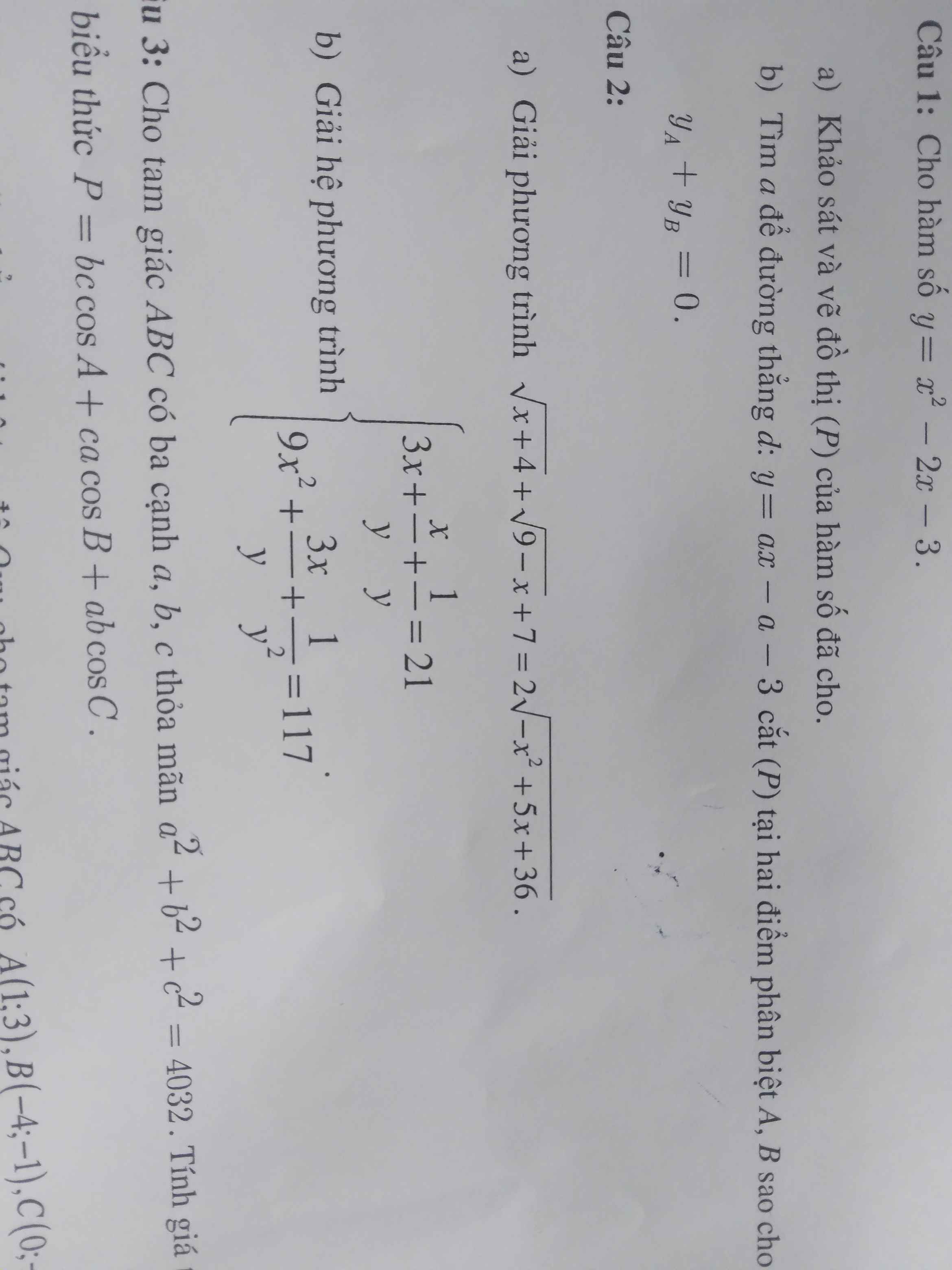
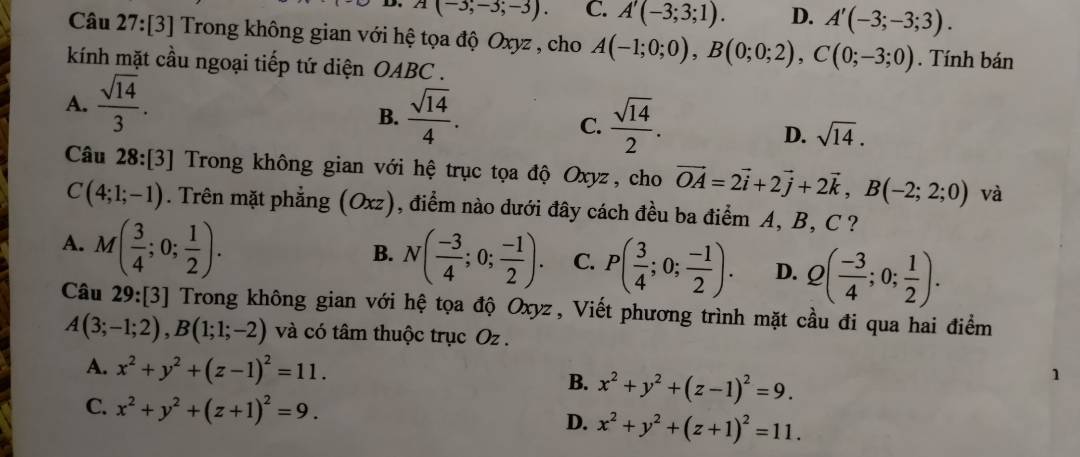
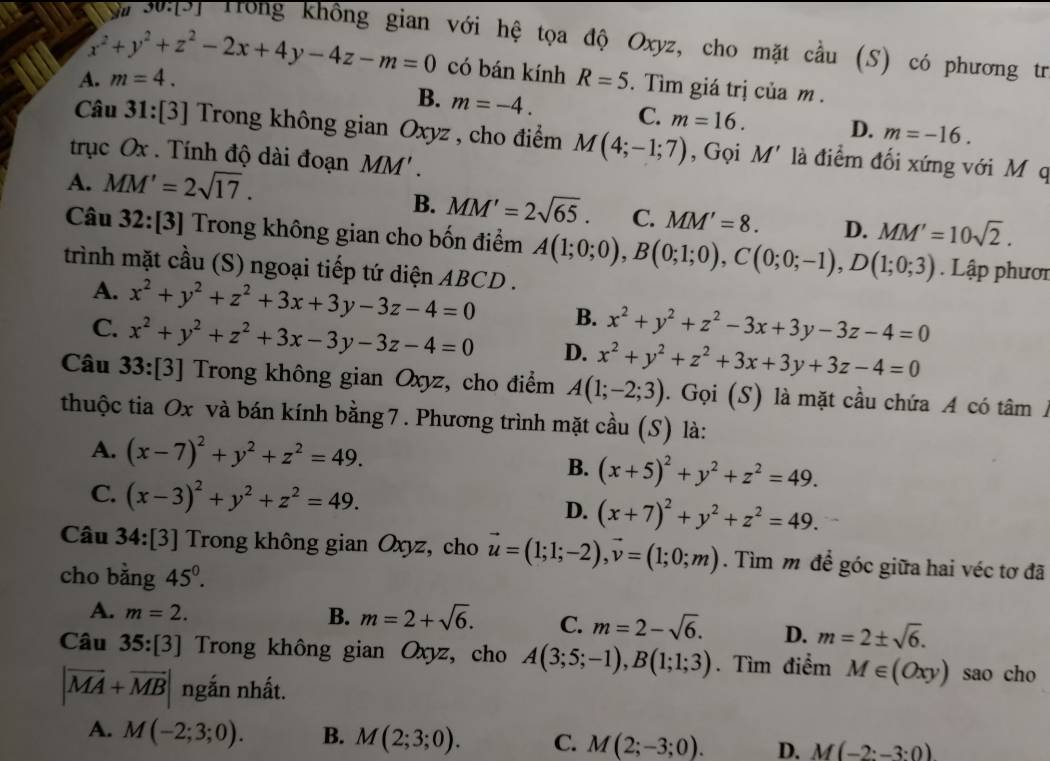
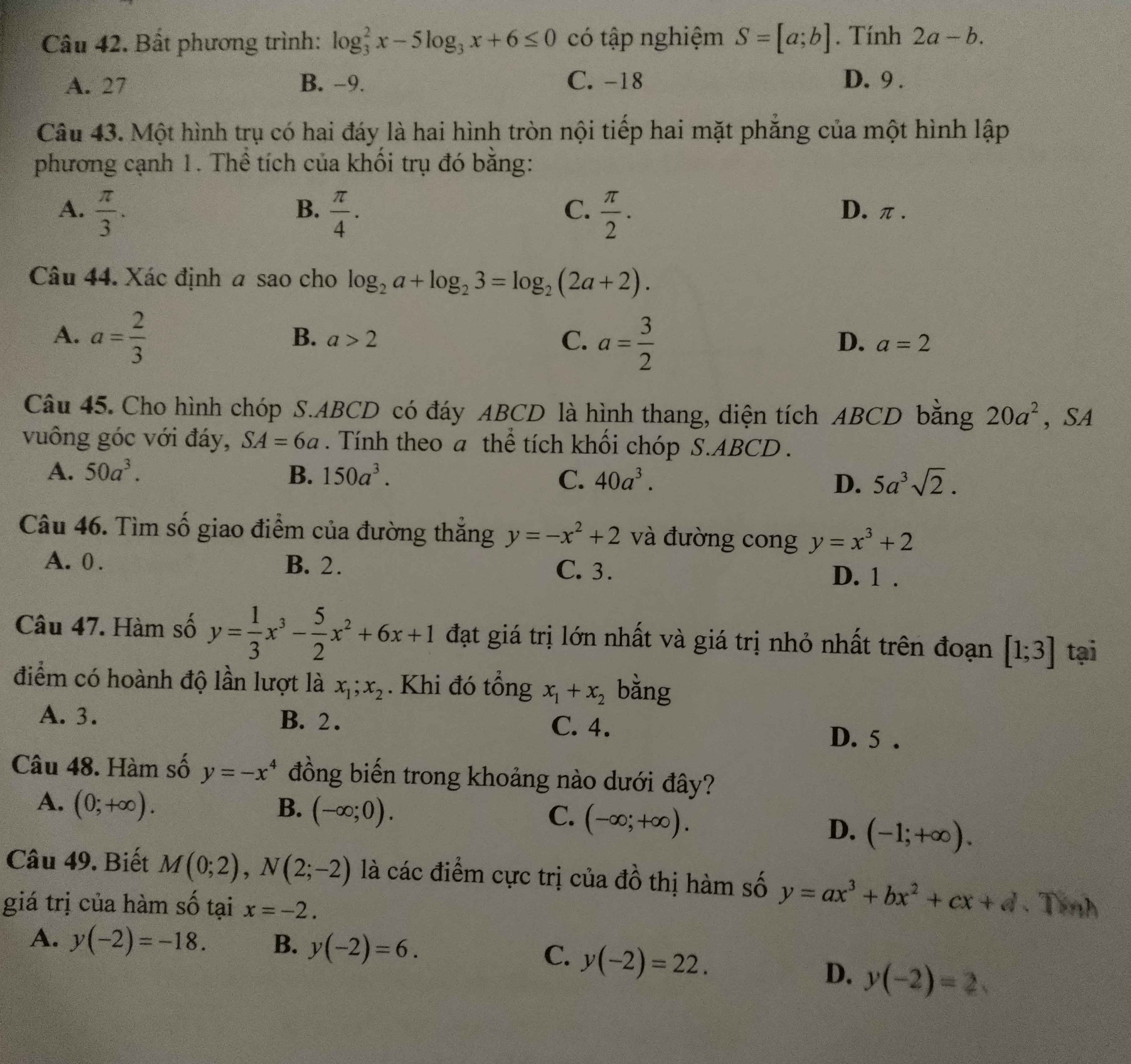


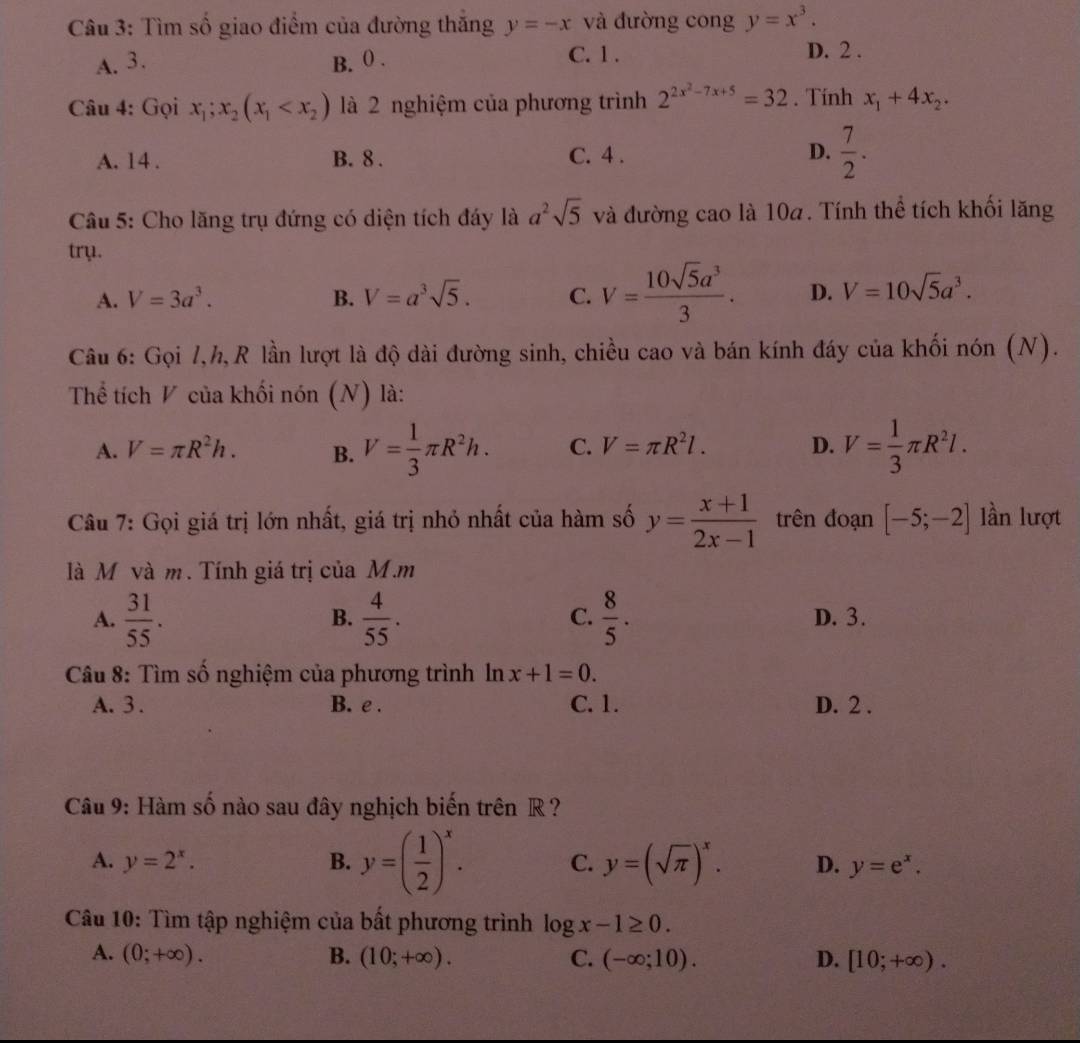
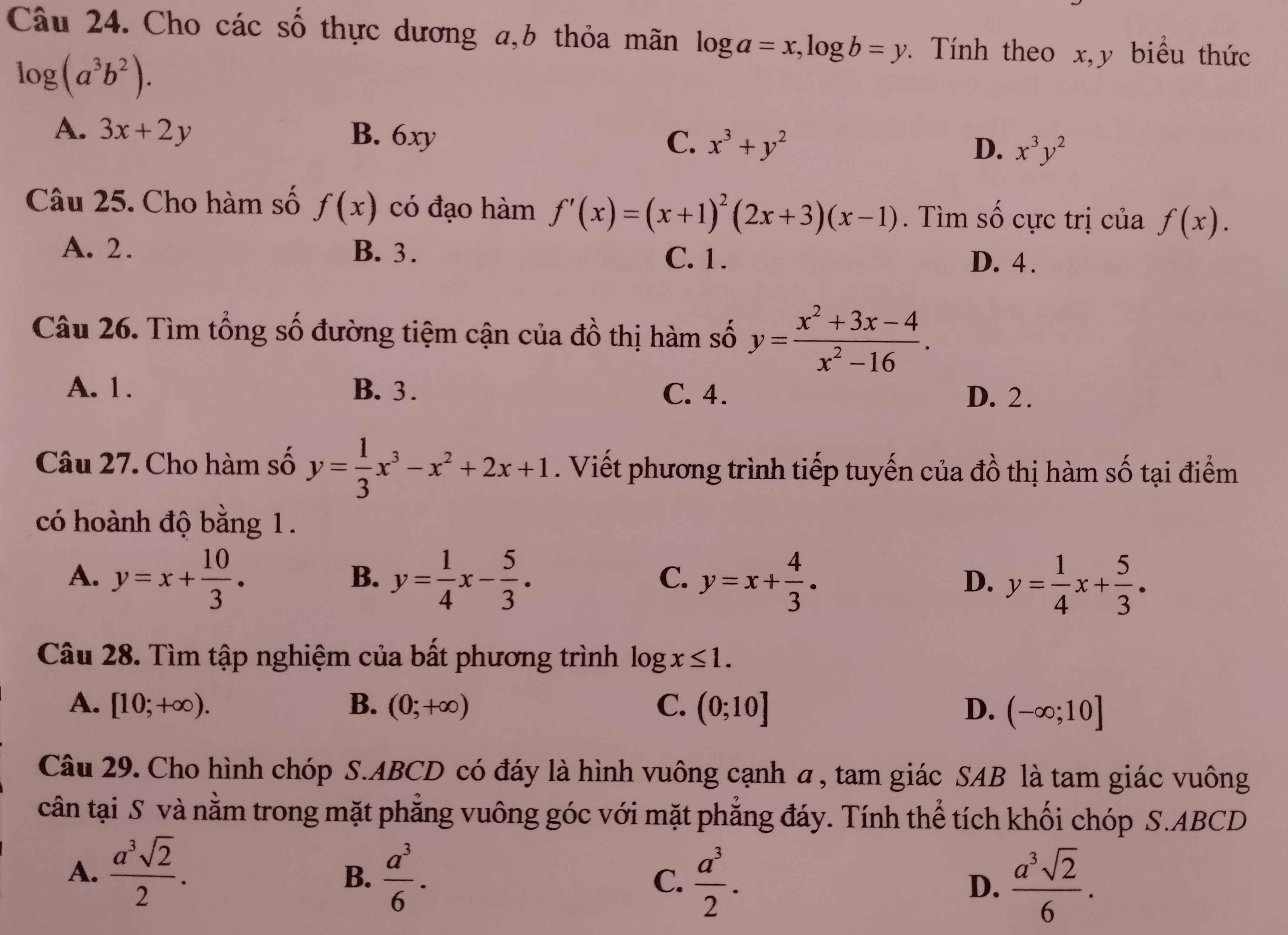
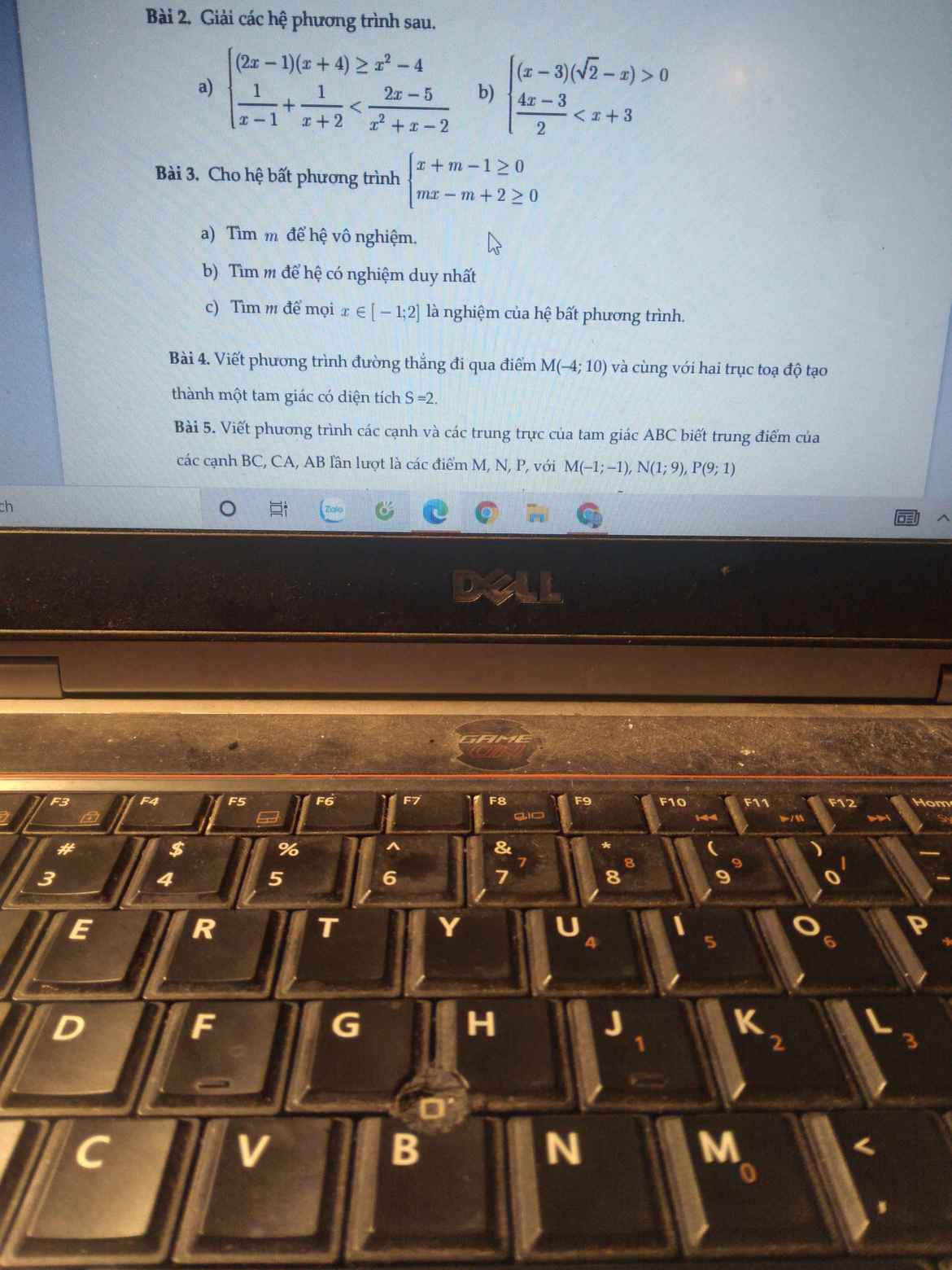
\(\Leftrightarrow sinx+sinax=\sqrt{3}cosx-\sqrt{3}cosax\)
\(\Leftrightarrow sinax+\sqrt{3}cosax=\sqrt{3}cosx-sinx\)
\(\Leftrightarrow\dfrac{\sqrt{3}}{2}cosax+\dfrac{1}{2}sinax=\dfrac{\sqrt{3}}{2}cosx-\dfrac{1}{2}sinx\)
\(\Leftrightarrow cos\left(ax-\dfrac{\pi}{6}\right)=cos\left(x+\dfrac{\pi}{6}\right)\)
\(\Leftrightarrow\left[{}\begin{matrix}ax-\dfrac{\pi}{6}=x+\dfrac{\pi}{6}+k2\pi\\ax-\dfrac{\pi}{6}=-x-\dfrac{\pi}{6}+k2\pi\end{matrix}\right.\)
\(\Leftrightarrow\left[{}\begin{matrix}\left(a-1\right)x=\dfrac{\pi}{3}+k2\pi\\\left(a+1\right)x=k2\pi\end{matrix}\right.\)
\(\Leftrightarrow\left[{}\begin{matrix}x=\dfrac{\pi}{3\left(a-1\right)}+\dfrac{k2\pi}{a-1}\left(a\ne1\right)\\x=\dfrac{k2\pi}{a+1}\left(a\ne-1\right)\end{matrix}\right.\)